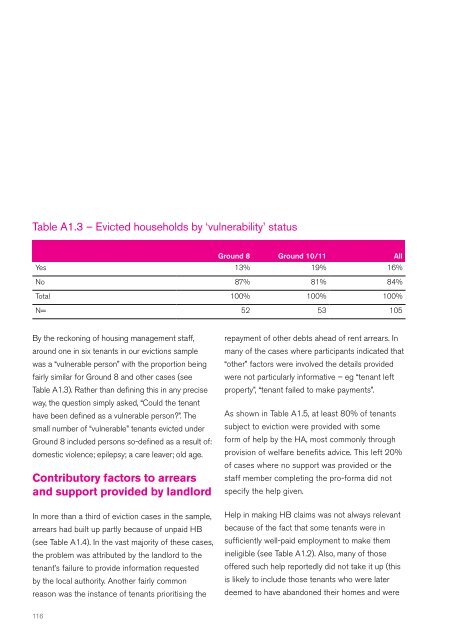Rent arrears management practices in the housing association sector
Rent arrears management practices in the housing association sector
Rent arrears management practices in the housing association sector
Create successful ePaper yourself
Turn your PDF publications into a flip-book with our unique Google optimized e-Paper software.
Table A1.3 – Evicted households by ‘vulnerability’ status<br />
Ground 8 Ground 10/11 All<br />
Yes 13% 19% 16%<br />
No 87% 81% 84%<br />
Total 100% 100% 100%<br />
N= 52 53 105<br />
By <strong>the</strong> reckon<strong>in</strong>g of hous<strong>in</strong>g <strong>management</strong> staff,<br />
around one <strong>in</strong> six tenants <strong>in</strong> our evictions sample<br />
was a “vulnerable person” with <strong>the</strong> proportion be<strong>in</strong>g<br />
fairly similar for Ground 8 and o<strong>the</strong>r cases (see<br />
Table A1 .3) . Ra<strong>the</strong>r than def<strong>in</strong><strong>in</strong>g this <strong>in</strong> any precise<br />
way, <strong>the</strong> question simply asked, “Could <strong>the</strong> tenant<br />
have been def<strong>in</strong>ed as a vulnerable person?” . The<br />
small number of “vulnerable” tenants evicted under<br />
Ground 8 <strong>in</strong>cluded persons so-def<strong>in</strong>ed as a result of:<br />
domestic violence; epilepsy; a care leaver; old age .<br />
Contributory factors to <strong>arrears</strong><br />
and support provided by landlord<br />
In more than a third of eviction cases <strong>in</strong> <strong>the</strong> sample,<br />
<strong>arrears</strong> had built up partly because of unpaid HB<br />
(see Table A1 .4) . In <strong>the</strong> vast majority of <strong>the</strong>se cases,<br />
<strong>the</strong> problem was attributed by <strong>the</strong> landlord to <strong>the</strong><br />
tenant’s failure to provide <strong>in</strong>formation requested<br />
by <strong>the</strong> local authority . Ano<strong>the</strong>r fairly common<br />
reason was <strong>the</strong> <strong>in</strong>stance of tenants prioritis<strong>in</strong>g <strong>the</strong><br />
116<br />
repayment of o<strong>the</strong>r debts ahead of rent <strong>arrears</strong> . In<br />
many of <strong>the</strong> cases where participants <strong>in</strong>dicated that<br />
“o<strong>the</strong>r” factors were <strong>in</strong>volved <strong>the</strong> details provided<br />
were not particularly <strong>in</strong>formative – eg “tenant left<br />
property”, “tenant failed to make payments” .<br />
As shown <strong>in</strong> Table A1 .5, at least 80% of tenants<br />
subject to eviction were provided with some<br />
form of help by <strong>the</strong> HA, most commonly through<br />
provision of welfare benefits advice . This left 20%<br />
of cases where no support was provided or <strong>the</strong><br />
staff member complet<strong>in</strong>g <strong>the</strong> pro-forma did not<br />
specify <strong>the</strong> help given .<br />
Help <strong>in</strong> mak<strong>in</strong>g HB claims was not always relevant<br />
because of <strong>the</strong> fact that some tenants were <strong>in</strong><br />
sufficiently well-paid employment to make <strong>the</strong>m<br />
<strong>in</strong>eligible (see Table A1 .2) . Also, many of those<br />
offered such help reportedly did not take it up (this<br />
is likely to <strong>in</strong>clude those tenants who were later<br />
deemed to have abandoned <strong>the</strong>ir homes and were




